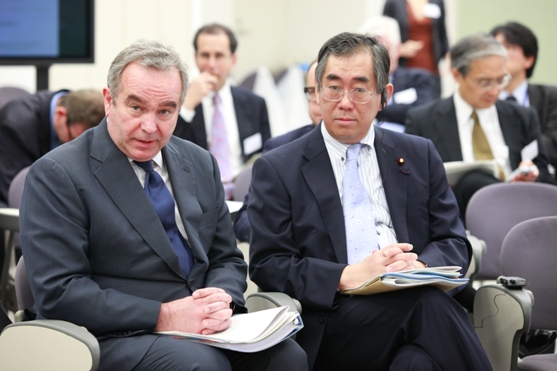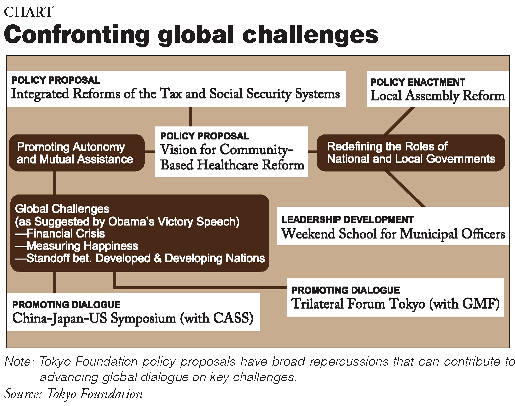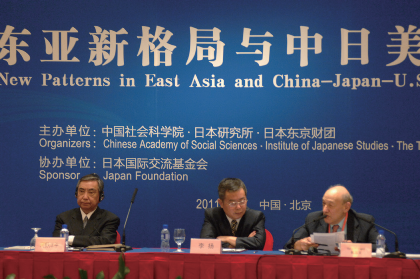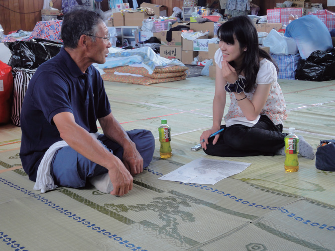Iron Triangle
The role of think tanks is inevitably affected by the political and administrative milieu of the country in which they operate. In the case of Japan, for the first four decades following the end of World War II, the “iron triangle” comprising the ruling Liberal Democratic Party, the business community, and the bureaucracy steadily charted the nation’s rise into the world’s second-largest economy.
By working closely with politicians and business leaders, the bureaucracy, in effect, constituted a mammoth “think tank” whose proposals were almost 100% implemented. This is not to say there was no competition among policy options, for various agencies vied with one another over issues under their jurisdiction. The intensity of such internal competition, though, precluded the need for—and consequently the development of—external institutions to offer recommendations from an independent perspective.
The once impregnable “iron triangle” began showing signs of fallibility, though, with end of the Cold War and the collapse of the bubble economy in the early 1990s, which ushered in an era of stagnation in Japanese society, politics, and economy. The two decades of stagnation, combined with the graying of the population and decline in the birthrate, caused the national debt to mushroom and has pushed up healthcare and other social security costs to unsustainable levels.
The changes that swept across Japan clearly indicated a need to overhaul the institutions that were once so entrenched. Japan groped in the dark for answers, but a consensus on new directions for the country could not be forged in the face of diversifying values and lifestyles.
The share of single-person households today is nearly 30%, and the percentage of the 65-and-over population has increased to 23%. Women increasingly entered the workforce after the Equal Employment Opportunity Law came into force in 1986; the low point in the M curve expressing the labor participation ratio of women during the childrearing years rose from 49% (for the 30–34 age group) in 1985 to 68% (35–39 age group) in 2010.
At the same time, the myth of lifetime employment has collapsed, and many more men have been forced to accept non-permanent positions, with 20% being employed on a contractual, part-time, or other non-regular formats. The “model” nuclear family on which public policies were based during the high-growth years consisted of a bread-winning father, home-making mother, and two kids, but this can hardly be said to be the norm today.
Inasmuch as any changes to the institutional status quo, such as child allowances, tax deductions for spouses, and pension benefits, inevitably mean that some members of the public wind up getting the short end of the stick, gaining public endorsement for sweeping reforms is no easy matter. As a result, the policies and institutions that supported Japan’s postwar expansion are no longer in touch with the current reality.
The immediate challenge confronting Japan is to implement policies that more effectively address the country’s urgent needs in the face of a slower-growing economy and a dwindling population. Since the bureaucracy was an integral component of the “triangle” that has failed to halt the stagnation, its erstwhile status as an almighty “think tank” has likewise dissipated. It is in this context that private, independent research institutions have stepped up to fill the void.
Key Players in the Knowledge Economy
The Tokyo Foundation is an independent, not-for-profit public policy think tank that brings together the minds and skills of outstanding human resources through policy research and global leadership development projects to offer fresh perspectives and create insights that lead to positive social change. Legally mandated to pursue the public interest, the Tokyo Foundation is unique in financing some 30 projects simultaneously just with income earned through endowment investment, without recourse to outside grants or subsidies.

The Tokyo Foundation is thus not bound to the interests or agendas of affiliated companies or government agencies. It is free to conduct research and analysis from a truly objective position and to offer realistic options for the directions the country should head.
For private public policy think tanks to become key players in intellectual discourse, they need to be possessed of five features. First, they must have the ability to create independent arenas for free and in-depth discussions among a broad spectrum of stakeholders— academics and other specialists; bureaucrats, whose job is to actually implement policies; businesspeople acutely aware of problems with the status quo; policymakers involved in drafting legislation; and journalists who have broad influence over public opinion. Such arenas should be fundamentally different from government councils, which are established with concrete policy objectives in mind. In order to create forums where diverse—even opposing—viewpoints are represented, think tanks must have the perspicacity to identify and attract specialists who can make truly valuable contributions, regardless of their affiliation or nationality.
Second, they must be independent of political or economic stakeholders so that projects can be undertaken with a free hand.
Third, they must possess the tools to actually have their proposals implemented. They need to take their recommendations to lawmakers, bureaucrats, businesses, and civic groups, working with them where necessary to achieve needed changes. This is perhaps one of the biggest differences with academic institutions; scholars are wont to accumulate volumes of data to postulate and prove a hypothesis. Think tanks must take a more proactive approach to cope with ongoing issues and take firm steps toward real-life reforms.
Fourth, think tanks need to explore how policies affect an individual’s ties to the community, the community’s ties to the country, and the country’s ties to international society, particularly in the face of the growing interconnectedness of people around the world. Ordinarily, think tanks focus their research on a narrowly defined field, and little thought is given to the potentially vast “sphere of influence” each policy measure has. But to formulate truly workable policies, the impact of those policies not only on the field intended but also in related areas needs to be taken into account.
And fifth, they need an international mindset capable of identifying how the research results can contribute to the resolution of issues confronting countries around the world.
Healthcare Reform
Our recently issued policy proposal on healthcare reform offers a good illustration of how the Tokyo Foundation incorporates the above points in coming up with and disseminating its recommendations. Japan is considered a success story for promptly putting in place a system of universal healthcare coverage. Today, however, anxiety over the country’s medical and nursing care system has reached new heights in the light of the increasingly rapid aging of the population and the ballooning of the nation’s public debt to unsustainable levels. As a result of the many minor revisions made over the years, moreover, the existing system has become extremely complex.
To date, no effective solution has been found to rein in ballooning medical costs and remedy the excessively intricate system. Both physicians and pharmaceutical companies take the healthcare insurance system as a given, so there are no incentives to keep costs down. Users, meanwhile, are unlikely to endorse cost-cutting measures if they mean a downgrading of medical services.
Sweeping reforms are urgently needed, and for this a bold new healthcare vision is required. As an example of the first feature that think tanks must possess, the Tokyo Foundation’s project on “Crafting the Medical, Nursing-Care, and Social Security Systems of the Future” served as an arena for debate among members with widely divergent backgrounds and viewpoints—practicing physicians, former health officials, civil society representatives, and medical consultants. They explored the sustainability of the current system, built around industry-based health-insurance schemes intended for full-time, permanent employees, using a neutral, free-handed approach different from those used either by lobbyists hired by pharmaceutical companies or by civic groups that petition the government to undertake changes; such an approach may produce short-term results but will not offer a fundamental solution for a system that is on the verge of financial collapse.
Believing that the uniformity of medical costs throughout the country is a major factor behind the spiraling of these costs as well as confusion among patients regarding where best to receive medical attention, the Tokyo Foundation proposed a set of reforms to promote community-based primary care that assigns greater responsibilities to local authorities so that medical services can be “tailor-made” for each locality.
Proposals that even temporarily or partially deprive voters of vested interests are not likely to be issued by political parties. Corporate research institutes, likewise, are reluctant to recommend measures that ask consumers to shoulder a bigger burden. But there are times when someone needs to point out that the “emperor has no clothes”. Such a role is probably best fulfilled by a public-interest organization like the Tokyo Foundation. This conforms to the second feature that think tanks must have.
To actually get its reform proposals implemented—the third feature think tanks should have—the Tokyo Foundation distributed its healthcare recommendations to legislators, physicians and other medical professionals, bureaucrats, care-givers, NPOs, and health insurance companies. We hosted a briefing for members of the media, met individually with Diet members, and conducted debates with medical groups. Ordinarily, lobbyists are hired to promote such recommendations, but this is a task we choose to do on our own because we strongly believe our proposals will promote the public interest. These efforts have elicited many comments—both pro and con—on the Internet and through social media, and we are accordingly refining our recommendations to incorporate some of the most pertinent remarks.
Cross-cutting Issues
Our policy recommendations, of course, have much broader real-world implications for people’s ties to the community and the state than just for the medical and nursing care industry (Chart). This ties in with the fourth feature cited earlier.

For example, one recommendation calls for ending the centralized, uniform control of the health market by the Ministry of Health, Labour, and Welfare and giving local governments fuller responsibility for tailor-making the system for each community, as noted above. This represents an attempt to fundamentally alter the existing relationship between national and local authorities.
From this it is clear that healthcare reform is closely linked to the issue of decentralization and local government reform. At the Tokyo Foundation, the healthcare project is thus organically linked to such other projects as that for local assembly reform and a leadership development program called the “Weekend School for Municipal Officers”.
The healthcare issue also raises questions about the financial sustainability of Japan’s social security system as a whole. The country’s public debt has risen to levels that preclude any consideration of additional outlays to expand benefits. A more efficient and effective system must be put into place that is in keeping with today’s fiscal realities. Working with fiscal and tax experts on a three-year research project on integrated reforms of the tax and social security systems, in March 2012 the Tokyo Foundation issued a vision ahead of the enactment of a reform bill calling for incentives toward greater self-help efforts in the country’s social security policy.
Domestic Issues with Global Implications Sweeping changes to the healthcare market will also have broad implications for the nation’s pursuit of free-trade agreements, particularly the Trans-Pacific Partnership (TPP), whose negotiations the government of Prime Minister Yoshihiko Noda hoped to join. Because the TPP, in principle, calls for the full liberalization of all markets, though, it has elicited vehement protests from the medical, nursing care, agriculture, and labor sectors of the economy. Export industries like autos, on the other hand, strongly advocate Japan’s participation, and the issue has sharply divided the nation. It is also one that has both foreign policy and domestic dimensions and is thus addressed by the Tokyo Foundation from both of these angles.
The TPP will have a large bearing on trade relations with China; in fact, as soon as Japan announced its interest in joining the negotiation process, Beijing made an overture on a trilateral agreement that also includes South Korea. Inasmuch as Japan is currently embroiled in territorial disputes with these neighbors, the TPP can also be said to have strategic and diplomatic implications.
Relations with China have recently become quite tense, and popular opinion in the two countries can become quite emotional. This is a concern also for the United States, with which Japan has a security alliance. An unbiased survey of the situation is all the more important in this context, and so the Tokyo Foundation carries out projects in Contemporary Chinese Studies and Contemporary American Studies to fulfill this role. We also take a broader look at trends throughout Asia and Europe through our Eurasian Information Network and have issued policy proposals on Japan’s foreign and security policies.
We believe it is not enough to simply issue recommendations, however, and have actively taken diplomatic initiatives at the Track 1.5 and 2 levels to strengthen and deepen Japan’s ties with other countries. One example is the Tokyo Foundation’s participation in security dialogue with think tanks in India and South Korea starting this year. This was the fruit of several years of research on national security issues in Asia, focusing on the implications of China’s rise over the next two decades.

Since 2011, moreover, the Tokyo Foundation and the Chinese Academy of Social Sciences have been jointly organizing a trilateral dialogue among Japanese, Chinese, and US experts. Despite the fact that China canceled many official bilateral events in the wake of the Senkaku row this year, a second trilateral dialogue was held in Beijing in August, which offered a precious window through which to view China’s real and deeply-held concerns. Keeping open a channel of level-headed communication at a time when media reports are increasingly adopting a nationalist tone can be said to be one of the most important roles that an independent think tank can play.
Aftershocks of the Lehman Crisis
Japan is not the only country groping for ways to strike a balance between the conflicting needs for fiscal responsibility and income redistribution through a stronger emphasis on mutual assistance frameworks at the community level.
In his book Aftershock: The Next Economy and America’s Future (Random House, 2010), former US Secretary of Labor Robert Reich wrote, “Our history swings much like a pendulum between periods during which the benefits of economic change are concentrated in fewer hands, and periods during which the middle class shares broadly in the nation’s prosperity and grows to include many of the poor.”
With the world still reeling from the once-in-a-century financial crisis, the US and the countries of the European Union, too, are confronted with the need to enhance social safety nets, even as public debt climbs to dangerously high levels. Such concerns are reflected in President Barack Obama’s reelection speech: “What makes America exceptional are the bonds that hold together the most diverse nation on Earth—the belief that our destiny is shared.”
In Britain, Prime Minister David Cameron has called for stronger community ties through the fuller engagement of not only social entrepreneurs and community activists but also common citizens.
The common challenge facing many developed nations is how to make the most of limited fiscal and material resources and revive economic growth. These difficult times have prompted many in these countries to ponder the real meaning of happiness. These are themes that are now being widely discussed by the public policy community around the world, including the Salzburg Global Seminar, the Aspen Institute, and even the World Economic Forum. Topics like “faith” and “values” are being openly discussed among business and political leaders who assemble at the Brussels Forum, hosted by the German Marshall Fund of the United States (GMF).
Sharing Knowledge
Many political issues deal with core, fundamental human concerns that affect people in not only national capitals but also suburban neighborhoods and rural communities. Increasingly, they also have implications transcending national boundaries, so addressing them effectively requires an international outlook-the fifth feature that think tanks need.
Getting to the heart of the issue, moreover, requires venturing into the “field” to gain a firsthand understanding of the problem. The March 2011 earthquake and tsunami seriously disrupted the life of the nation, but the disaster also highlighted some of the strengths of Japanese society, as seen in the spirit of mutual assistance among the survivors and the strong leadership demonstrated at the grassroots level.

To document the lives and experiences of the survivors of this unprecedented disaster, the Tokyo Foundation launched the “101 Voices from Tohoku” interview project. These accounts, told entirely in the first person in their own words, present a unique window into the minds and hearts of those who lived through the disaster, enabling readers to share their revelations and insights and pointing to the directions that the reconstruction effort should take. The 101 accounts have been uploaded on a special website, been published as a book, and were also provided to the digital archives of Harvard University.
The Tokyo Foundation also actively pursues wide-ranging intellectual dialogue with think tanks around the world. In April 2012, we co-organized Trilateral Forum Tokyo with the GMF, inviting leading opinion makers from Japan, the US, and Europe. The two-day forum explored a broad range of cross-cutting challenges confronting the three regions, including the crisis of democratic governance, disaster relief, global financial instability, security dynamics, energy sustainability, and world trade.
Becoming an important player in international discourse is what the world now expects of Japan. The days when Japan’s contributions were largely in the form of a checkbook—as during the Gulf War—are over. Japan confronts many of the most pressing issues faced by the global community, such as stagnant growth, the rapid aging of the population, and climate change, including natural disasters, and it has a responsibility to share its experience and approaches with the world and to work together to formulate solutions.
Japan’s position in the world cannot be enhanced simply by increasing the volume of English-language communications; there needs to be a pooling of ideas and knowledge with global partners based on a recognition of a common destiny. As one of Japan’s leading public policy think tanks, the Tokyo Foundation seeks to play its part in consolidating Japan’s status as a valued member of the international intellectual community.
Reprinted with permission from Economy, Culture & History JAPAN SPOTLIGHT Bimonthly (published by the Japan Economic Foundation), January/February 2013 issue, pp. 8–11.

